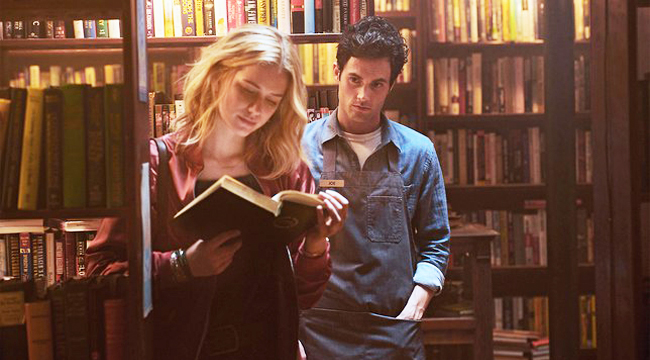
(Spoilers from You will obviously be plentiful below.)
You debuted last fall as a Lifetime series with Penn Badgley starring as the sociopathic stalker in an adaptation of Caroline Kepnes’ novel (that terrified Stephen King) of the same title. Despite being compulsively watchable, the show didn’t spark much buzz while airing on a week-to-week basis. You then started streaming on Netflix over the holidays, which opened it up to a whole new audience that’s reveling in its absurd, pulpy, confusingly thorny appeal on social media, which highlights how much more more potent the series is while binged. It’s addictive, so a second season will eventually go straight to Netflix.
The series is almost maddening to enjoy because You cloaks itself in deceptive layers. It’s full of exaggerated atrocities and veers wildly between genres, but at its core, it’s a horror story, an obliteration of narcissism, and a tragic but satisfying satire. It’s also problematic and has inspired silly tweets about people wanting to stuff Badgley down their pants. Ultimately, You forces its audience to stare directly at the big picture — that Joe is an unquestionable monster — while also pelting them with nuances and twisting the stalker into the protagonist. For the most part, his victims are insufferable people, but his love interest, Beck (Elizabeth Lail), is mostly wonderful, so it’s guilt-inducing to watch Joe ruin this young woman’s life.
Indeed, You is the ultimate guilty pleasure. Here are a few reasons why.
1. You Is A Dish Best Served Whole — This is not a show that lends itself to a weekly watch, followed by days of processing or mulling over or forgetting what happened before the next episode. You must be binged in order to encourage proper momentum with which to better enjoy yelling at the screen at every stupid decision made by a character or every reckless action from Joe. The sense of disbelief you’ll feel is astounding but almost high-inducing. Part of why it’s so infuriating — and why you’ll hate loving this show — is that Beck stews inside an enormous pot of toxic masculinity for the entire season. And then there’s Joe’s twisted moral code. He truly believes that he’s saving her (in a gentlemanly way) from the people that he murders.
Below, Joe’s own ironic voiceover even strikes a disconcerting mix of being appalled by behavior like his own — he’s staking out her NYC apartment while her shades are wide open — and also obviously not owning it.
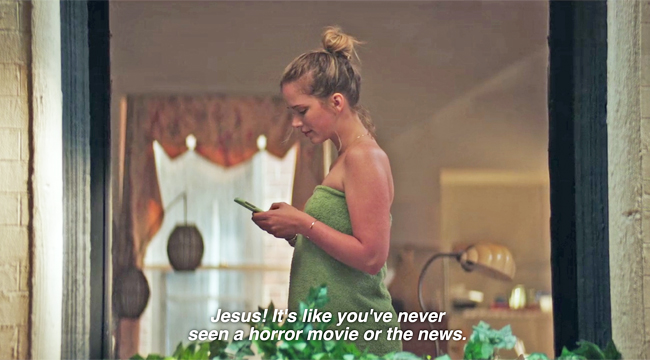
He’s sloppy as hell while executing his crimes, by the way, and oh my god, it’s funny, despite it all. This is from a different scene than the one above, but the juxtaposition works to convey the mood.
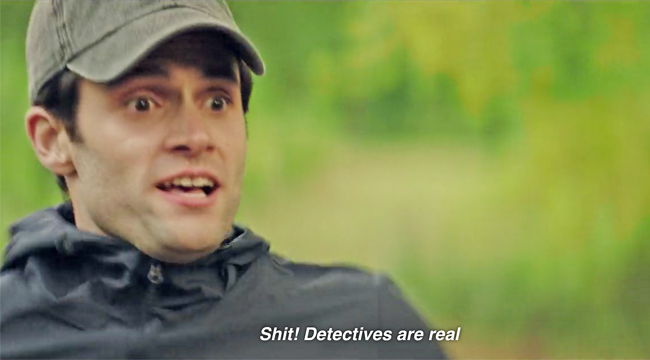
2. The series skewers the concept of the “nice guy” — Joe’s an expert at mimicking healthy relationship behavior and studies his prey so well that he’s able to model his own persona to be exactly who she wants. In return, Joe believes that he’s entitled to the prize, whether that’s sex or happily ever after with Beck. Hey, he’s a nice guy who helps the elderly flag cabs and gives his meatball sandwich to a kid! Yet his designs are revolting. Joe takes the classic “she’s wearing a short skirt, so she’s asking to be raped” sentiments and amplifies them. He feels absolutely entitled to own Beck because she laughs at his jokes, and his inner monologue is terrifying while he draws assumptions. Should women worry about using a credit card in a bookstore, lest this be interpreted as an invitation to stalk because their card shows off their legal name? Are they begging a man to stare at their chest by reaching up to grab a book from a top shelf? No, of f*cking course not.
Beck ends up in this relationship while not realizing that she’s being stalked. Well, it’s hard to tell how Beck really feels because we only see her through Joe’s eyes and narration. He sort-of writes the script of how we see her, in a Ruby Sparks way, and lines like these would come off as too self-aware, if not for the pulpiness of the entire show.
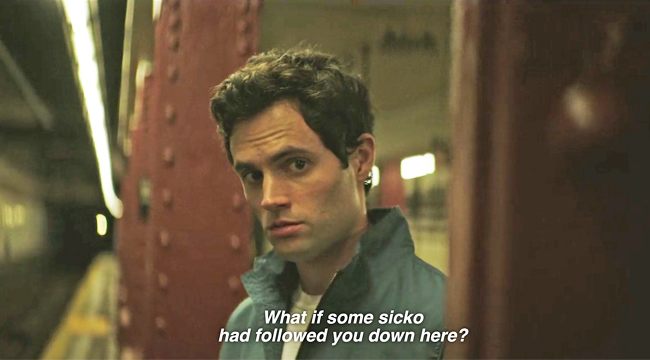
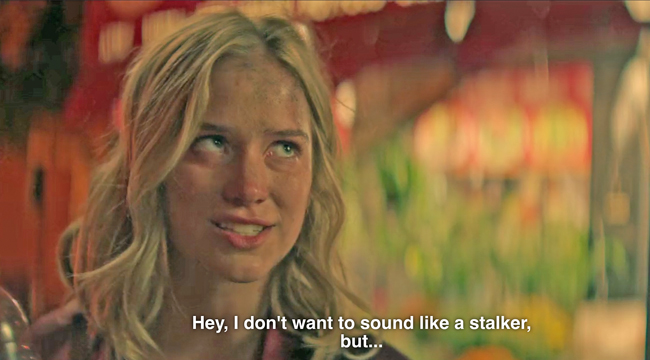
3. John Stamos plays a weed-smoking therapist — This is really the absurd kicker for this show. The weed serves a medical purpose, or does it? And does it matter? Anyhoodle, Dr. Nicky counsels both Beck and Joe after their breakup, although the latter doctor-patient relationship happens under false pretenses. I’m also pleased to see that Joe didn’t kill him off because I want him back in season 2. This honestly may be Stamos’ finest role, or maybe it’s simply the one he clearly relished the most. I hope to learn one day that Stamos actually smoked weed before every scene. Please don’t tell me he used contact lenses to make his eyes all wonky — that would ruin everything.
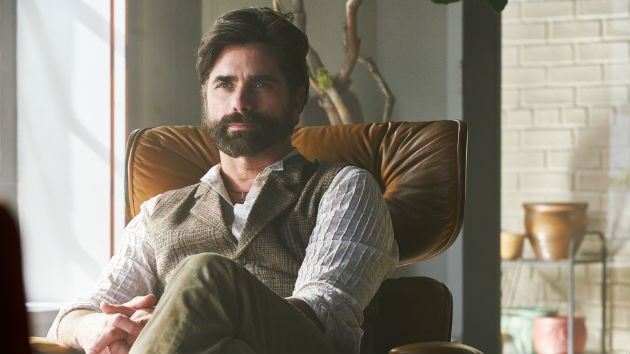
4. Beck’s dad is referred to as “The Captain” –– Yes, she literally has her dad listed under this nickname in her phone. There’s an official explanation for why, but it’s best that we ignore it and pretend that he’s an intentionally absurd touch to make a simple point — everyone’s a little screwed up by their childhood. There’s also a reason why The Captain is wearing this outfit, but again, it’s best if one imagines that there isn’t one. And don’t ask me why there’s a ladle in Beck’s kitchen that she says used to belong to her “dead” dad. Or why her sort-of boyfriend thinks she likes to be spanked with it. What a troll job.
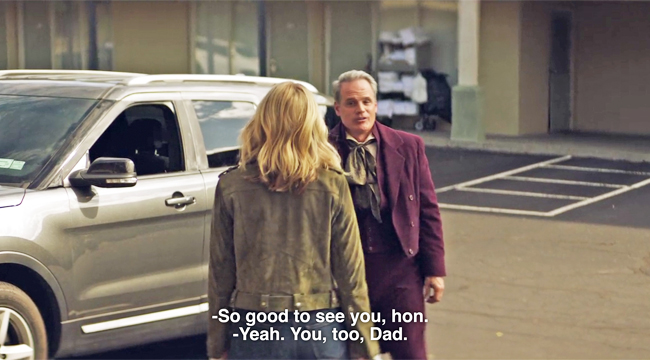
5. So, about that boyfriend, Benji — Joe crosses some lines, murderous ones. That’s after he breaks into Beck’s apartment, steals her phone, and keeps the old device connected to the cloud, so he can still read the texts on her new phone. Really though, Joe excels at his mission by being everything that Benji is not. Joe’s outwardly gentlemanlike, caring, and super attentive, and he gives her space when she asks for it (because he’s playing the long game) without freaking out. Overall, he has no trouble appearing to be a better boyfriend that this guy, who’s chasing the dual legacy of being an artisanal soda CEO and cocaine connoisseur. What a combo, right?
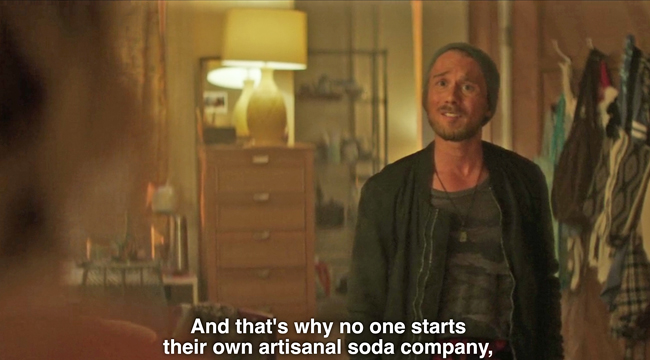

Despite the fact that Joe’s obviously gonna kill someone — and he actually does kill someone(s), including Benji — Beck can’t win. She’s caught between her murderous suitor and Benji, along with the thesis advisor and literary agent who pressure her for sex. Everywhere she turns, toxic masculinity rears its head, and it’s as if You knows that there’s simply no escape. The tragic thing, though, is that Beck doesn’t even know that she’s being terrorized by Joe until close to the end of the season. She’s very much the victim in this story, but You doesn’t allow her to gain justice. That would be the easy way out of the story, which isn’t easily tied up like a Law & Order episode.
Let’s face it, real life isn’t neat and tidy either. It’s unapologetically cruel at times. So perhaps that reason, along with the inevitability that you’ll enjoy Joe’s shenanigans — despite their very clear horror — is why You is so dangerously enjoyable. And why too many people will binge the second season, too.






